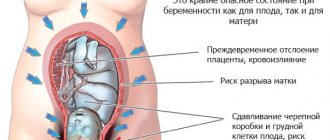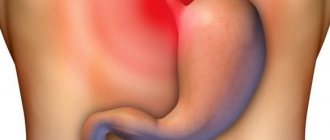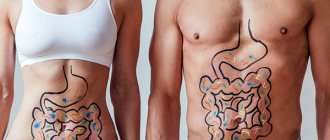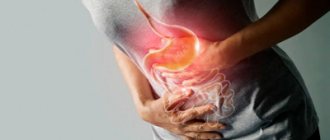Category: First aid and treatment
Statistics that know everything say that every second person experiences digestion difficulties and abdominal discomfort. Moreover, the most interesting thing is that most cases occur in rich and developed countries of the world. It is also interesting that the prevalence of the disease depends on gender. It turns out that women get sick one and a half times more often than men!
And one more fact - most often people between the ages of seventeen and thirty-five suffer from gastrointestinal problems.
How to get your stomach started at home using medication
The main reasons causing atony (popularly known as gastric arrest) include the following factors:
- improper diet;
- consequences of taking antibiotics and anti-inflammatory drugs;
- cholecystitis;
- pancreatitis;
- gastritis and ulcers;
- neoplasms in the gastrointestinal tract: both malignant and benign.
The cause may be intoxication, an allergic reaction, or infections in the stomach.
The best option to speed up the recovery process is an integrated approach: using medications and following nutritional rules.
What to do to make the stomach work, and what measures need to be taken, depends on the age of the patient.
It is easy to identify a disease in a child, because symptoms manifest themselves in refusal to eat and whims. First aid is as follows:
- The baby must be placed on his side and his legs bent.
- Place a warm heating pad on your stomach for 20-30 minutes.
- Give a glass of water to drink and massage the abdomen for half an hour.
If a child feels nauseous, it is better to induce vomiting and thereby clear the stomach.
On a note!
If such cases are repeated systematically, then the usual menu should be reconsidered.
The approach to treating an adult consists of taking medications and proper nutrition. In case of intoxication, moderate fasting and taking black or white activated carbon will help.
Stomach arrest in pregnant women is a natural phenomenon. This is caused by changes in the functioning of the body. To prevent the disease, doctors advise eating often, but in small portions, and consuming large quantities of vegetables and fruits. If, after following all the recommendations, there is no improvement, you will have to contact a specialist so that he can prescribe the appropriate treatment.
We recommend: How to rinse the stomach in case of poisoning at home for children and adults
Alcohol poisoning
If you drink alcohol regularly, no remedy will help. Isolated cases of intoxication are treated with Mezim and Gastal. True, there is a strict rule - complete abstinence from alcohol.
Regulating the action of the gastrointestinal tract using powders and tablets should not last more than three months. “Overdoing” treatment, instead of providing relief, will harm the human body.
Diagnostics
The above-described signs of deterioration accompany patients with ulcers, cancer, and gastritis. That is why it is important to quickly do a comprehensive examination and prescribe timely treatment. When establishing the correct diagnosis, doctors use the following diagnostic methods:
- inspection, palpation, tapping;
- prescribing laboratory tests (blood, stool);
- endoscopic examination of the digestive tract;
- use of contrast agent when performing x-rays;
- instrumental examination (ultrasound);
- If the functions of the nervous system are impaired, it is important to seek advice from a specialist.
Reviewing the final results of diagnostic testing methods allows doctors to understand what to do in a particular situation and prescribe individual treatment.
Signs of stomach failure
Symptoms that indicate a problem:
- The occurrence of sharp or dull pain in the abdominal area.
- Feeling full from a minimal amount of food.
- Lack of appetite.
- Heaviness in the stomach and bad breath.
- Bloating.
Sometimes there are other unpleasant sensations - hiccups, shortness of breath, increased body temperature.
The reasons listed above can be caused not only by atony, but also by ulcers, prolapse of the stomach, and exacerbation of gastritis. So only a gastroenterologist can make an accurate diagnosis after appropriate research.
If it is established that the stomach is stuck, what to do, how to start normal processes? Treatment of the disease should be carried out through diet, the use of medications and the use of physical therapy exercises.
Therapy problems
Consultation and dynamic observation of various specialists is necessary - a gastroenterologist, nutritionist, psychotherapist.
Treatment should be comprehensive, including medications, as well as proper nutrition, herbal medicine (infusions of dandelion, ginseng, chamomile, rosehip) and diet therapy, lifestyle changes, physical therapy and correction of concomitant diseases. The basic principle in nutrition is eating fractionally and in small portions. In this pathological condition, a daily diet is selected with a nutritionist and gastroenterologist.
It is recommended to completely exclude alcohol, chocolate, coffee, fresh vegetables, fried, smoked, salted and marinades. As well as fatty foods, especially cakes and pastries.
Therapeutic measures are aimed at eliminating nausea and vomiting, enhancing gastric motility and peristalsis, restoring proteins, trace elements and vitamins in the body.
It is important to include regular exercises in your lifestyle to strengthen the abdominal and abdominal muscles. It’s worth learning to do the “vacuum” exercise in the morning: strongly draw in your stomach and hold your breath for 15 seconds, 10-12 times.
Medicinal plants: 45 recipes for a healthy stomach and liver Read more
Start of stomach after poisoning
Treatment after toxic substances enter the body is recommended as follows:
- Drink at least one and a half liters of filtered water per day.
- Eat five to six times a day in small portions.
- Before meals, drink up to two hundred milliliters of liquid.
- On the first day after poisoning, eat crackers, rice or oatmeal cooked in water.
We recommend: How to cleanse the body after antibiotics?
Medicines that restore the gastric mucosa help speed up recovery.
Restoring gastric motility
Improving metabolism is facilitated by the use of combination medications, among which Pancreatin is particularly effective. Its role is reduced to splitting:
- proteins and amino acids;
- starch;
- fat
The undoubted advantage of “Pancreatin” is the absence of contraindications, with the exception of individual intolerance and acute forms of gastrointestinal diseases.
Folk remedies for restoring gastric motility
At home, non-traditional “medicines” are also useful for treating pathologies. As the experience of traditional healers shows, here’s what you need to do to get your stomach working:
- Before meals, eat a teaspoon of crushed milk thistle and drink water.
- Prepare a solution of oregano in the following proportion: pour 10 grams of the herb with a glass of boiling water. Let sit for thirty minutes. Drink two sips twice a day.
- Dilute half a teaspoon of soda in a glass of water and drink.
- Pour boiling water (200 ml) over a teaspoon of cinnamon and stir. Bring to a boil over low heat, stirring constantly. Set aside after five minutes. Drink the cooled decoction on an empty stomach three times a day, half an hour before meals. The course of treatment is three to four days.
With the help of such means it will not be difficult to start the stomach, but it is better not to take the matter to the extreme and prevent it from stopping.
Systematic walks in the fresh air and a properly selected diet have a positive effect on the digestive organs.
Useful exercises
In combination with pills and herbal medicine, to make the stomach work, and subsequently for prevention, a set of simple exercises is used:
- “bicycle” - you need to lie on your back, bend your knees and imitate how the pedals are spinning;
- lying on your back, bending your knees and clasping them with your hands, you need to swing on your back;
- “birch” - from a lying position, raise your legs straight up and lower them down behind your head, trying to touch the floor.
These exercises will not let you down if your stomach has stopped working, you are constipated, or have trouble passing air.
What to do if pathology appears
At the first symptoms of the disease, it is necessary to first determine the cause. If the root cause is not addressed, any measures will only bring temporary relief. Pathology is usually provoked by factors such as:
- poorly prepared food;
- binge eating;
- abuse of salty, spicy and smoked foods;
- consequences of surgery on the stomach or intestines;
- smoking;
- stress, hassle;
- recent infectious diseases.
Causes
Stomach blockage occurs due to disruption of the stomach.
There are several factors that provoke the development of the disease:
- tumor formations form in the stomach;
- the disease develops because the tumor makes it difficult for food to move;
- The cause of damage to the mucous membranes may be radiation therapy;
- adhesions can be seen on the walls of the stomach;
- scar changes occur after surgery;
- inflammatory processes are accompanied by a decrease in the diameter of the pylorus of the stomach;
- gastric blockage may be associated with cholelithiasis;
- there are complex forms of constipation that develop due to Parkinson's disease;
- in many patients the pathology is congenital;
- taking medications that impair motility affects the movement of food through the stomach;
- clogging of the stomach may be associated with the consumption of low-quality products; curious children may accidentally swallow an inedible object;
- Gastric atresia leads to overgrowth of the canals, which impede the free movement of food;
- with hypertrophy of the gastric wall, the patient suffers from constant bouts of vomiting.
Changing your diet
The World Health Organization classifies one of the problems with the gastrointestinal tract as nutritional, i.e. caused by either a deficiency or excess of food intake.
We recommend: What pills should you take for nausea?
In this case, it is recommended to review the menu and focus on:
- products low in fat and fiber, but containing a sufficient amount of vitamins and amino acids necessary for the body;
- exclude carbonated drinks, baked goods, and legumes from the menu - they contribute to the formation of gases;
- refrain from foods that “fix” the stomach - rice, pears, boiled eggs.
It is extremely important to eat often, but in small portions. Give preference to boiled or liquid food.
Symptoms of the disease
The main signs of pathology include:
- constant attacks of vomiting mixed with bile;
- the body tries to get rid of food by any means;
- a person becomes dehydrated and becomes weak in the body;
- nausea and flatulence occur;
- clogging of the stomach is accompanied by abdominal pain, a person begins to have diarrhea;
- with indigestion, bloody clots appear in the stool;
- the temperature rises, the patient loses appetite;
- accumulation of blood in the patient's stool indicates internal bleeding.
There is a risk of death due to untimely treatment.









